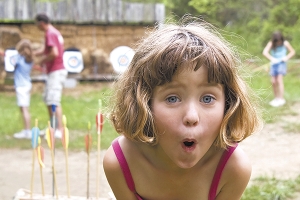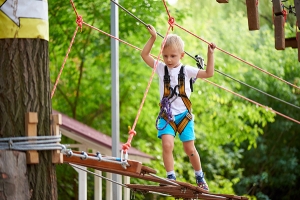
Mom, my friends go to summer camp every year and have so much fun! Can I please go?
Kids hear about fun camp activities from friends or how they met so many people, and they want to have the same experiences. But not every type of camp is suitable for every child. It’s worth the effort to think about and discuss options with your kids. From summer-long sleepaway camps to local day camps that last a few hours, there are options for every family.
Understand Different Camp Types
Before registering for spring or summer camp, it’s important to understand the types of camp available. It’s the first step in thinking through what works best for your child and family.
Sleepaway Camps (also called overnight camp or resident camp)
- Long-term camps are three weeks or longer and best for ages 10 and up who have experience being away from home and parents.
- Short-term camps are two weeks or less and typically best for ages 8 and up who have experience being away from home and parents.
- Single overnights are more rare, but sometimes are combined with a day camp program. They are best for ages 7 and up who have previously spent the night away from parents.
Day Camps
- Long-term summer day camps are full-day programs that last three consecutive weeks or more. Kids go home at the end of each day. Ideal for ages 5 and up.
- Weekly full-day programs are usually five consecutive days (Monday thru Friday) and ideal for ages 5 and up. Week-long camps give parents flexibility to sign up for different themes and different weeks that are not consecutive.
- Half-day (or partial) camps are 2–5 hours a day for multiple (often consecutive) days. They are ideal for toddlers and up (depending on program).
- Single-day camps are one-day events, either full or partial day. Ideal for ages 5 and up.
Find local spring break and summer camp programs in our Summer Camp Guide!
Things to Consider When Choosing Camps
Every family has different factors to consider, such as personal preferences, ages, budget and work schedules, in addition to the following:
Purpose
Consider why you want your child to attend camp. Ask yourself the following questions:
- Is my child asking to attend camp or showing any interest?
- Do I need camp for childcare?
- Do I want my child to develop confidence and leadership skills?
- Do I want my child to make new friends?
- Am I looking for my children to have unique experiences while they’re out of school?
- Is there some other motivator?
Other Factors
Once you understand the motivators, consider these factors:
- How far am I willing to drive for drop off and pick up?
- Are my kids ready to sleep away from home? If so, how long am I willing to allow them to be gone?
- What is our budget?
Camp Focus and Theme
Next, think about camp themes, topics and areas of focus. There are dozens to consider.
- SOCIAL: While all camps have a social element, some camps focus on social interaction, SEL and relationship building.
- ACADEMIC: These camps may include writing, history, STEAM (science, technology, engineering, art and math) or college prep.
- SPECIALTY TOPIC: Camp programs that focus on a specific topic such as nature, theater arts, cooking, circus activities, dance, creative arts, filmmaking and many more.
- SPORTS: Some sports camps focus on one sport to increase specific skills (swimming, soccer, gymnastics, surfing, fencing, baseball and more), while others offer multiple sports to provide kids a sampling of each.
- SERVICE: Service camps focus on helping others. Kids spend time doing community service projects such as painting or planting flowers, relationship-building activities like playing with kids or spending time with older adults, or other projects like supporting local food banks or animal shelters.
- VARIETY: Many camps focus on a variety of activities and being outdoors. This is often what people think of when they imagine being at camp. Bonfires, hikes, crafts, water sports, archery, rock climbing and more—all for the sake of having fun with other kids.
Your Child
Does your child have specific needs or desires when it comes to camp themes? It’s important (and fun) to involve kids in the decision-making process, however possible. Parents can determine the parameters first (budget, length, distance, etc.), then give kids a few options. Be sure to attend camp open house events, if available, to familiarize everyone with programs and facilities.
An Important Reminder
There is definitely a camp program your child will enjoy. If you don’t find it the first time around, take experiences into account and try again. Talk to other families, do your research and read reviews to learn things about each camp and make informed decisions. It’s time to get fired up spring and summer—and get fired up for camp!
Rebecca Hastings is a freelance writer.
Find local spring break and summer camp programs in our Summer Camp Guide!

















